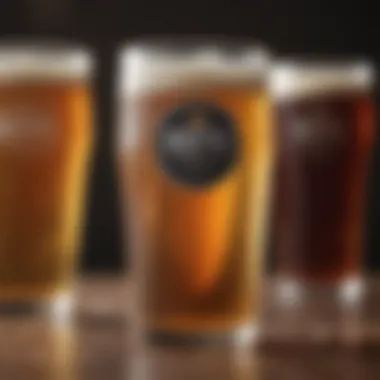Is Beer Keto Approved? A Comprehensive Examination


Intro
In today’s world, where dietary choices define lifestyle, the ketogenic diet stands out for its emphasis on low carbohydrate intake. Beer, often enjoyed socially or as a form of relaxation, carries a complex relationship with this diet. Understanding whether beer is compatible with a ketogenic lifestyle involves more than surface-level scrutiny. It requires exploration of the biochemical implications, calorie counts, and health effects involved.
The overarching question "Is beer keto-approved?" leads us into an investigation covering various beer types and their carbohydrate content. Furthermore, the role of alcohol within the context of metabolic health demands careful consideration. This discussion aims to foster a nuanced understanding of how beer interacts with ketosis, highlighting potential alternatives for keto followers seeking rich flavors without crossing their carb thresholds.
Beer and Ketosis Overview
Delving deeper into the compatibility of beer and the ketogenic diet necessitates defining what ketosis is. Ketosis is a metabolic state characterized by the presence of elevated ketone bodies due to carbohydrate restriction. When on a keto diet, the aim is to keep carbohydrate intake low, thereby forcing the body to utilize fat as the primary energy source.
Beer's Intrinsic Composition
To appreciate its impact on this metabolic strategy, it's essential to analyze beer's intrinsic composition. Generally, beer can contain a considerable amount of carbohydrates depending on its type. Lighter beers tend to have fewer carbs, making them a more favorable option for those trying to maintain or enter ketosis. In contrast, heavier ales or stouts can quickly consume permissible daily carb limits, making moderation an essential principle.
Key Factors to Consider
When considering beer on a keto diet, keep the following factors in mind:
- Serving Size: Note the volume served, as larger servings lead to higher calorie and carb consumption.
- Type of Beer: Understand the types available such as lagers, ales, and stouts, which harbor different carbohydrate levels.
- Alcohol Content: Higher alcohol beverages often contain more calories but an intricate balance exists between alcohol's effects and ketosis.
Reflecting on these variables equips individuals with critical tools for analysis, supporting informed decisions about potential beer selections.
For those health-minded individuals seeking enjoyment without jeopardizing their diet, a careful examination of beer choices can enhance both social interactions and wellness commitments.
Carb Content in Various Beers
A substantial variation in carb content exists among different beer types. Below, the carbohydrate counts for primary beer categories may guide choices:
- Light Lagers: Often contain around 3-5 grams of carbs per serving.
- Regular Lagers: There is typically about 10-15 grams of carbs.
- Ales and IPAs: These tend to range from 10 to 25 grams or more, depending on the style.
- Stouts and Porters: Carry marked carb levels, frequently exceeding 20 grams.
Tread selectively, as the temptation to indulge in fuller flavors must be moderated if keto adherence is maintained.
Understanding the Ketogenic Diet
The ketogenic diet, a plan characterized by its low-carb and high-fat structure, has gained popularity for its potential benefits in weight management and overall health. Understanding this diet helps in evaluating the relationship between beer and ketosis. With the right knowledge, individuals can make informed choices about what to consume, including alcoholic beverages like beer.
Fundamentals of Ketosis
Ketosis is a metabolic state where the body predominantly burns fat for fuel instead of carbohydrates. When carbohydrates are scarce, the liver converts fatty acids into ketones. These ketones serve as an alternative energy source, influencing fat loss and energy levels. Achieving and maintaining ketosisis often the goal for many on a ketogenic plan. This state can be obtained by consuming fewer than 50 grams of carbohydrates daily. Readers should note that individual variances in metabolism may lead to differences in how quickly a person enters this state.
Key aspects of ketosis include:
- Conversion of fats into ketones for fuel.
- Reduction in blood sugar levels.
- Suppression of insulin production.
Knowledge about these fundamentals provides insight into how to effectively navigate nutritional decisions.
Health Benefits of Keto
The ketogenic diet offers several benefits beyond weight loss, appealing to those seeking a lifestyle change. Adherents tout aspects such as improved mental clarity, reduced hunger, and potential benefits for diabetic management and epilepsy control. Science has started to explore these claims as well. For example, studies suggest ketogenic diets may stabilize blood sugar levels, making them a useful tool for people with type 2 diabetes. Also, the focus on healthy fats might positively impact heart health and reduce inflammation.
Some observed benefits include:
- Increased cognitive function.
- Enhanced satiety and reduced cravings.
- Lowered inflammation markers in the body.
Recognizing these benefits allows individuals to consider not only the diet itself but how it can interact with lifestyle elements, such as alcohol consumption.
Beer: An Overview
Understanding beer is crucial when exploring its place in a ketogenic diet. Beer holds status as one of the most popular beverages in the world. This resonates particularly with social contexts as well, thus a topic that sparks interest among many. Various dimensions, including its history, types, and predominant brewing methods, provide insight into this multifaceted drink. It establishes a baseline for examining its nutritional value, especially its carbohydrate content, and how these factors interact with a low-carb lifestyle.
Origins and Brewing Process


Beer has a long history, tracing back over seven thousand years. Its origins link closely to ancient civilizations that discovered fermentation while storing grain. This serendipitous find led to numerous iterations of beer globally, each reflecting local ingredients and preferences.
The core brewing principles often remain constant: mash preparation of grains, boiling with hops, fermentation using specific yeast strains, and eventual maturation. Each step significantly influences beer's final characteristics, aroma, and flavor profile. For instance, the choice of malt impacts sugar conversion, which is essential when considering carbohydrate levels for keto dieters.
It is also important to note that different cultures have adapted the brewing process, resulting in diverse flavors and purposes. Some beers align better with ketogenic practices than others, offering utility in moderation without excessively derailing dietary goals.
Types of Beer
Diverse beer types reflect regional styles and brewing technology. Common varieties include lagers and ales, which are distinguished mainly by fermentation methods. Most ales typically have a robust profile due to top fermentation. This fermentation raises yeast to the surface, leading to slightly higher bitterness and flavor complexity. Lagers, on the other hand, utilize bottom-fermenting yeast, resulting in a cleaner taste. When considering ketosis, lower-carb options exist among beer types, within categories of light beers and craft beers specifically without additional sugars.
Several classifications within these types should concern keto dieters. Not every beer should be dismissed entirely. In fact, some varieties such as Michelob Ultra or Budweiser Select contain fewer carbohydrates, providing possibilities for those aiming to maintain ketosis. Balancing these low-carb beers within one’s regular consumption allows enjoyment amid dietary restrictions, focusing on counting total carbohydrates rather than simple abstention.
Every variety carries unique attributes and nutritional profiles, influencing overall suitability for ketogenic diets.
Nutritional Composition of Beer
Understanding the nutritional composition of beer is essential for those following a ketogenic diet. It allows individuals to make informed choices about their alcohol consumption without derailing their health goals. Beer’s ingredients, including its manufacturing process, play a significant role in determining its caloric and carbohydrate profile.
Carbohydrates in Beer
Beer typically contains carbohydrates derived from the brewing grains, which provide sugars needed for fermentation. During the brewing process, enzymes break down starches into fermentable sugars, which affects the end product. Regular beers can have upwards of 10 to 15 grams of carbohydrates per serving, which pose a concern rhythm the ketogenic guidelines. In contrast, low-carb options are increasingly available, with some containing fewer than 5 grams per serving.
Understanding these differences is critical for those adhering to reactive carbohydrate limits, often recommended to be under 20 to 50 grams per day. Choosing a lower-carb beer, such as Michelob Ultra, can theoretically minimize risk of exiting ketosis.
Alcohol Content and Calories
The alcohol content in beer is measured as a percentage of alcohol by volume (ABV), varying significantly among different types of beer. Typically, light beers champion lower ABV percentages, usually around 3% to 4%. Regular beers may escalate to 5% or higher. Caloric content follows much the same reasoning. A standard 12-ounce beer can measure between 150 to 200 calories, but light versions can clock in under 100 calories.
Alcohol serves as a source of empty calories. This means, they provide energy without nutritional benefit. Consuming high-calorie beers can quickly accumulate daily caloric intake frustration penitentiaries).
“It’s important to integrate your beer choices with your overall daily caloric allowances to sustain a successful ketogenic lifestyle.”
Essential Nutrients in Beer
Although beer's primary nutritional contributions are carbohydrates and calories, it also contains several essential nutrients. Vitamins and minerals such as B vitamins, magnesium, and potassium occur naturally in beer, although not in sufficient amounts to make a significant difference in dietary needs. B vitamins are practically unavoidable since they play a crucial role in cellular metabolism.
Here are some notable nutrients found in beer:
- B vitamins: Uphold energy production
- Silicon: Shown to benefit bone density and joint health
- Polyphenols: Provide antioxidants that may offset some caloric downsides
Is Beer Keto Approved?
The growing popularity of the ketogenic diet brings many questions to the forefront of nutritional discussions. Among them, the compatibility of beer with this dietary approach has garnered significant attention. The essential query here is whether individuals seeking to remain in a state of ketosis can safely consume beer without jeopardizing their dietary goals.
One main element to understand is carbohydrate intake. The ketogenic diet places strict limits on carbohydrates to induce ketosis, a metabolic state where the body burns fat for fuel. Thus, knowing if beer meets these criteria is crucial. This section will provide insights into specific carbohydrate limits established by ketogenic principles, along with considerations for anyone on this diet.
Additionally, people following a keto regimen often seek options that alumni promote lower carb counts. There are beers that aim to serve this niche market, giving intersted parties the chance to indulge without overwhelming their carbohydrate limits. Understanding which types of beers are available, along with their specific contents, becomes vital for informed decision-making.
By exploring the nuances involved in the compatibility of beer with a ketogenic diet, individuals can make better choices about what aligns with their health targets.
Carbohydrate Limits on Keto
In the ketogenic context, carbohydrates serve as a primary consideration for those aiming to achieve or maintain ketosis. The general recommendation is to maintain carbohydrate intake to around 20 to 50 grams per day. Exceeding this limit can result in the body burning glucose instead of fat, disrupting the metabolic state critical for the keto diet.
The calculation of net carbohydrates is particularly significant. Net carbs are defined as the total carbohydrates minus fiber and certain sugar alcohols, which the body either does not digest or absorbs very minimally.
Total carbohydrate content limits founded in ketogenic principles can apply to selecting beer. Regular beers tend to contain much higher carbohydrate quantities, frequently reaching beyond 10 to 15 grams per standard serving. Exercising caution and knowing how to read labels aids in avoiding unwanted carbohydrate consumption while indulging in beer. Some beer enthusiasts surveillance their intake closely, often using best practices to monitor themselves.
Low-Carb Beer Options


As keto-driven trends take hold, breweries are conscious of the community's requirements and have emerged with innovative brewing strategies. Low-carb beer options fit well within the context of a ketogenic diet, typically featuring lower than 5 grams of net carbs per serving. Several prominent brands have launched products aimed at individuals preferring less restrictive drinking choices.
When selecting, look for pictorial cues or labels denoting
Impacts of Alcohol on Ketosis
Understanding how alcohol affects ketosis is crucial for those who wish to maintain a ketogenic diet. Ketosis is a metabolic state where the body utilizes fat for energy instead of carbohydrates. When guests consume alcohol, they can disrupt this biochemical rhythm. Recognizing this impact ensures better adherence to keto principles while enjoying occasional indulgences.
Alcohol Metabolism Explained
Alcohol metabolism is distinct from other nutrients. Once consumed, alcohol is rapidly absorbed into the bloodstream from the stomach and intestines. Unlike carbohydrates which go through various pathways, alcohol is primarily metabolized in the liver. There, enzymes convert it into acetaldehyde, a potentially harmful compound, before it becomes acetate, which the body can utilize.
This metabolic process can take precedence over gluconeogenesis, the production of glucose from non-carbohydrate sources. When alcohol is available, the body favors metabolizing it first. Consequently, carbohydrate breakdown slows down. This priority can lead to higher blood alcohol concentration, making it challenging to maintain the state of ketogenesis. As a practical implication, a keto diet follower should be mindful of alcohol intake, especially with high-carb beverages and heavy consumption.
Effects on Blood Sugar and Insulin Levels
Alcohol has nuanced effects on blood sugar and insulin levels. When consumed in moderation, certain alcoholic beverages can cause a slight reduction in glucose production. However, overconsumption often leads to fluctuating blood sugar levels.
- Low-carbohydrate alcoholic drinks might minimally affect blood sugar but could still pose risks. The insulin response can become erratic, given the unpredictable nature of alcohol metabolism.
- In some cases, alcohol consumption can lead to hypoglycemia, particularly if drank during fasting hours or when carbohydrate intake is extremely low.
Important Note: Always consult with a healthcare provider before incorporating alcohol regularly into your diet plan, especially on a keto diet to negotiate potential complications.
Balanced Consumption
Balanced consumption of alcohol is crucial when considering its place in a ketogenic lifestyle. This approach ensures that consumers can enjoy beverages like beer without jeopardizing their dietary goals. Moderation, mindful choices, and an understanding of one’s limits are key components that require attention.
A balanced perspective focuses on recognizing how alcohol interacts with ketosis. Alcohol may stall ketone production or mislead blood sugar levels. Thus, moderation helps mitigate these potential negative effects. While socially enjoyable, consumption should not become habitual. In this context, less is often more; refraining from excessive drinking helps maintain clarity in health goals.
Moreover, knowledge about the types of beers available can inform better dietary decisions. Low-carb beers can fit into a keto framework more seamlessly, donating enjoyment without heavy carb loads. Including variety and balance during social engagements promotes adherence to keto principles over time. Such strategies ensure that cravings and temptations do not lead to unplanned deviations in carbohydrate intake.
A personal approach to managing alcohol limits can support long-term keto success.
Moderation in Alcohol Intake
Moderate intake is essential for anyone on a ketogenic diet, especially concerning alcohol. Understanding personal tolerance levels can make a significant difference. Each individual reacts differently to alcohol, thus it is important to monitor one’s response. Alcohol can influence decision making and cravings, impeding one's ability to stick to keto guidelines.
Definitely, keeping a count of drinks can help maintain moderation. Having set limits, such as two standard drinks per session, organizes alcohol consumption without undermining the diet. Emphasizing lower-alcohol options also plays a role in moderation. Lower alcohol by volume, or ABV, beers typically carry fewer effects and are gentler on metabolic functions.
Choosing the Right Beer
Selecting the appropriate beer is a skill for anyone maintaining a ketogenic diet. Not all beers are created equal; carb content varies significantly between styles. A comprehensive understanding of options allows consumers to define their choices intelligently.
When shopping for beer on a keto diet, focus on these criteria:
- Low-Carb Beers: Favor breweries that cater to low-carb drinkers. Some brands, like Michelob Ultra, have gained popularity for their low carb contents.
- Light Beers: These options generally offer less alcohol and fewer carbs. Notable light beers often come with tasting notes that suit various palates.
- Check Nutritional Labels: Reading labels or consulting brewery websites can help clarify carb and calorie counts. This knowledge allows pragmatic decision-making aligned with keto goals.
Balancing personal taste with health considerations leads to more non-alcoholic yet exciting alternatives.
Potential Risks and Considerations
Understanding the potential risks and considerations of beer consumption within a ketogenic diet is essential. This examination allows dieters and health enthusiasts to appreciate the nuanced balance that must be struck between enjoyment and health. Given that many who adopt a ketogenic lifestyle often prioritize their weight management and cognitive function, knowing how beer might hinder these goals warrants thorough analysis.
Weight Management Challenges
One of the significant concerns diverse keto dieters face is maintaining effective weight management. Beer contains carbohydrates, often more than what is favored in strict keto guidelines. Here are some key elements:
- Caloric Dense: Beer generally has a high caloric density which can indirectly interfere with weight loss goals. Even some low-carb options can pack in empty calories that contribute to daily allowances.
- Lack of Nutritional Value: While enjoyable, many beer types contribute little essential nutrients, which could lead to nutrient deficiencies overtime.
- Cravings Stimulation: Alcohol influences the brain’s response system, sometimes leading to food cravings, making it easier to indulge in unhealthy snacks.
Adopting moderation in alcohol intake can help manage these pitfalls. Choosing low-carb or light beers might lessen the adverse effects, yet, one must remain cognitive of their daily intake to uphold ketogenesis.


Impact on Mental Clarity
Mental clarity and cognitive function are critical aspects of an individual's daily life and productivity often emphasized by keto proponents. Alcohol, including beer, has well-known effects on mental faculties that should not be overlooked:
- Short-term Cognitive Impairment: Even a moderate intake might lead to temporary impairments in cognitive performance, affecting concentration and decision-making.
- Long-term Brain Health: Some studies indicate long-term alcohol consumption can increase risks of neural damage and memory issues.
- Mood Fluctuations: Beer can also affect mood stability. Heavy beer drinkers tend to experience swings that may not only influence mental acuity but emotional well-being as well.
Choosing to embrace occasional, moderate beer drinking within a keto lifestyle might suit some. However, understanding and addressing these potential risks, especially how they interconnect with one’s long-term health is key. Always consider personal responses to alcohol, as they vary broadly from individual to individual.
“Emphasizing moderation and being mindful of how beer affects your bodily responses is crucial for anyone focused on both weight and mental acuity.”
Alternatives to Beer on Keto
Exploring the alternatives to beer on a ketogenic diet offers significant insights for individuals who seek enjoyment in social drinking while adhering to carb restrictions. Beer, though appealing, typically contains a high amount of carbohydrates which can hinder wellness efforts. As such, looking for options that align better with keto principles is crucial. The exploration of low-carb cocktails and non-alcoholic drinks allows keto followers to maintain their lifestyle effectively.
There are distinct benefits to consuming low-carb alternatives. One, they minimize carbohydrate intake, which keeps individuals in a state of ketosis. Two, they often involve fewer calories, helping with weight management—an ongoing focus of those on ketogenic regimens. Three, recognizing these alternatives can enhance social experiences without diverting from dietary commitments.
In addition to these benefits, there are considerations surrounding the consumption of alternative beverages. With an assortment of products continuously entering the market, selecting low-carb cocktails or non-alcoholic beers requires careful examination of nutritional information. It is essential for consumers to seek brands that provide transparent labels, aiding in both safety and health communication.
Exploring low-carb alternatives can simplify staying on track with your diet while maintaining enjoyment in social settings.
Low-Carb Cocktails
Low-carb cocktails represent a broad category of beverage options that fit well within the framework of keto. Importantly, these cocktails often use ingredients low in sugars and refined carbohydrates, ensuring compatibility with the dietary guidelines. Common spirits like vodka, gin, and rum provide a solid base for these drinks. However, it is vital to understand that the mixer used often determines the final carb count.
When selecting mixers, choosing sugar-free sodas, tonic waters, or simply sparkling water without added sugars will result in a lively yet diet-friendly cocktail. Herbal garnishes and fruit extracts add flavor without contributing significantly to carbohydrates. Here are a few low-carb cocktail ideas:
- Vodka Soda: Just combine vodka with soda water and add a lime wedge.
- Gin and Tonic (Low-Carb): Opt for a sugar-free tonic
- Whiskey Sour: Use sugar-free syrup alternative or lemon juice only
Limiting the number of cocktails consumed enhances the keto aspect even further. This moderation can lead to more enjoyable drinking experiences while allowing drinkers to stay within their carb confines.
Non-Alcoholic Options
For individuals who prefer a completely alcohol-free approach, non-alcoholic options are widely available and increasingly diverse. The range of beverages can cater to various tastes. Non-alcoholic beers provide a closest substitute to traditional beer, often combining familiar flavors without the alcohol content and often with reduced carbohydrates.
Apart from non-alcoholic beers, herbal teas and infused water can offer refreshing alternatives. These drinks provide hydration without hindering one's ketogenic goals. Following are some enticing non-alcoholic choices:
- Non-Alcoholic Beer: Many varieties with low sugar content should be chosen carefully.
- Herbal Infusions: Focusing on flavors that stimulate like mint or hibiscus.
- Sparkling Water with Fruits: A splash of lemon or berries can enhance taste.
The crowded marketplace of drinks now includes many options tailored for those prioritizing health impacts associated with alcohol consumption. Ultimately, keto-friendly alternatives allow individuals to enjoy social events and personal time away from traditional beer consumption.
Culmination
The conclusion presents a crucial synthesizing element of this article. It serves to distill the various discussions held throughout the entire piece regarding the compatibility of beer within the ketogenic framework. While beer may not completely align with the ketogenic principles, there are pathways for moderation. Low-carb beer options exist, enabling compliance with carbohydrate limits, yet this approach must be weighed against the potential impacts on overall health and dietary adherence.
By putting together the findings from our analyses, we look at how beer, when consumed mindfully, can either complement or complicate a keto lifestyle. Health professionals, fitness trainers, and wellness coaches should be clear on the fact that the right choices lead to better experiences with dietary regimens.
Specific elements to focus on include:
- The carbohydrate density of beer, highlighting that many brands contain significant carbs which can disrupt ketosis.
- Understanding alcohol metabolism aids in discernment of effects on cognitive functions and weight.
- Recognizing alternatives, such as low-carb cocktails, provides viable options for those seeking social inclusion without jeopardizing dietary commitments.
In summary, embracing a keto lifestyle does not necessitate an absolute ban on beer, but rather an informed understanding. Individuals should evaluate their personal health objectives and make responsible choices rather than adhering to an overly strict regimen.
"The success in managing your keto lifestyle lies not just in restrictions but also in informed choices."
Synthesis of Findings
In synthesizing the information presented throughout this article, we observe intricate relationships between the components of beer and metabolic health. The analysis shows that while simple lagers often dominate the beer selection, options like those slight of higher alcohol volume or low-carb variations, may have fewer carbohydrates. Repeated discussions emphasized the importance of balance – focusing as much on quality as quantity of beer consumed.
Billing brewing processes reveal alcohol's interesting and sometimes confusing role within the keto realm. Each choice carries significance, ideally tailored to an individual’s health goals. Money and emphasis on moderation remain poignant. Upon assessment, personal enjoyment can reduce inhibition or strain with poor knit fabric amidst dietary frameworks.
Key Points of Synthesis:
- Keto diets prioritize low carbohydrate intake, typically under 50 grams per day.
- Beer temps’ alcohol swaps the target of the souls drunk. Their overall caloric density coupled with potential spikes in insulin levels showcases concern for keto adherence.
- The alternative approach offered a space for non-alcoholic variants or imaginative low-carb cocktails. Further emphasizing social life valued sobriety balance proves essential.
Thus, health and wellness factors alienate daily contributors. Many could assess preferences of lightness or sweetness based on addressed scoring with existing beer. Those seeking extensive diets need only corroborate spots wist foodner choos, combined wishes into desired returns.







